Pennsylvania's 12th congressional district
Pennsylvania's 12th congressional district is located in the north central and northeastern parts of Pennsylvania, including the Northern Tier region, parts of the Susquehanna Valley, and part of Happy Valley including State College. It has been represented by Fred Keller since May 21, 2019, who won a special election to fill the vacancy caused by the resignation of former representative Tom Marino.[2][3]
| Pennsylvania's 12th congressional district | |||
|---|---|---|---|
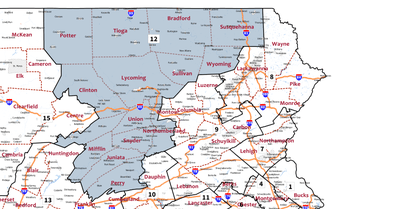 Boundaries since January 2019 | |||
| Representative |
| ||
| Cook PVI | R+17[1] | ||
Prior to 2018, the 12th district was located in southwestern Pennsylvania, and included all of Beaver County, and parts of Allegheny, Cambria, Lawrence, Somerset, and Westmoreland Counties. The Supreme Court of Pennsylvania redrew this and other state congressional districts in February 2018 after ruling the previous map unconstitutional due to partisan gerrymandering. The new 12th district covers much of the old 10th district. The old 12th district was redrawn to an area north and west of Pittsburgh and renamed the 17th district, for the 2018 elections and representation thereafter.[4]
Before the 2011 round of redistricting, the 12th District was widely considered to be gerrymandered by the Republican-controlled state legislature as a heavily Democratic district. It consisted of all of Greene County, and parts of Allegheny, Armstrong, Cambria, Fayette, Indiana, Somerset, Washington, and Westmoreland Counties.
Geography 2003–2013
Located in southwestern Pennsylvania, the 12th District consisted of all of Greene County, and parts of Allegheny, Armstrong, Cambria, Fayette, Indiana, Somerset, Washington, and Westmoreland Counties. A thoroughly unionized district, the 12th was historically among the most Democratic areas of the state. However, the Democrats in this area were not as liberal as their counterparts in Philadelphia and Pittsburgh. Most were somewhat conservative on social issues, particularly abortion and gun control.
The 12th included all of Greene County, a highly rural region that still has a traditionally Democratic influence due to its labor leanings. In Washington county, the city of Washington, a large and Democratic edge suburb of Pittsburgh was a part of the 12th, as well as the eastern portion of the county. Most of the Monongahela Valley region, a very Democratic area that was once an important steel-making area, was also part of the 12th. However, more rural western Washington County and the suburban northern portion of the county (with towns like McDonald and Canonsburg) then belonged to the 18th. The western portion of Fayette County, including the city of Uniontown, a labor Democratic stronghold was part of this district, while the rural mountainous eastern portion was a part of the 9th.
The 12th District continued eastward, including southeastern and northeastern parts of Westmoreland County, including the labor Democratic city of Latrobe, while leaving the suburban western part of the county (with towns such as Murrysville) and the generally left-leaning city of Greensburg in the 18th. The major population base of the district was located just to the east, taking in most of Somerset and Cambria counties. This area, the heart of a large coal-mining region, includes the district's largest city, Johnstown. The 12th also contained a part of Indiana County, mainly the college town of Indiana.
The 12th completed its wrap around the metro Pittsburgh region by ending in the northeastern corner of the city's suburbs, containing middle class regions such as Lower Burrell and the working class suburb of New Kensington. A portion of Armstrong County was also included in the district, including several industrial suburbs such as Freeport and Apollo.
Demographics
[data unknown/missing]
History
After the 2000 census, the Republican-controlled state legislature radically altered the 12th in an effort to get more Republicans elected from traditionally heavily Democratic southwestern Pennsylvania. A large chunk of the old 20th District was incorporated into the 12th. In some parts of the western portion of the district, one side of the street is in the 12th while the other side of the street is in the 18th District (the reconfigured 20th). This led to criticism that the 12th was a gerrymander intended to pack as many of southwestern Pennsylvania's heavily Democratic areas as possible into just two districts—the 12th and the Pittsburgh-based 14th.
Prior to the 2012 redistricting, the district has a Cook Partisan Voting Index score of R+1. The district is notable as the only congressional district in the nation that voted for Democratic presidential candidate John Kerry in 2004 but went for Republican John McCain in 2008. This is mainly due to the fact that since 2000 Southwestern Pennsylvania has gradually become more Republican leaning.
2006 election
In the 2006 election, Murtha was re-elected with 61% of the vote. His Republican opponent, Washington County Commissioner Diana Irey, received 39%.
2008 election
John Murtha won the 2008 election with 58% of the vote. Murtha was a United States Marine and the first Vietnam War veteran to serve in Congress. He defeated Lt. Col. William T. Russell, an army veteran.
2010 special election
Pennsylvania governor Ed Rendell scheduled a special election for May 18, 2010, following the death of Representative John Murtha. On March 8, 2010, the Pennsylvania Democratic Party's Executive Committee nominated Mark Critz, Murtha's former district director.[5] On March 11, a convention of Republicans from the 12th district nominated businessman Tim Burns.[6] The Libertarian Party's candidate was Demo Agoris, who ran for the Pennsylvania House of Representatives in the 48th district as a Libertarian in 2006.
Mark Critz won the election.
2010 election
Mark Critz was re-elected in the regularly scheduled 2010 election; again beating Republican Tim Burns (this time with 51% of the vote against 49%).
2012 election
Mark Critz ran for re-election to a second full term in the 2012 election, but was defeated by Republican challenger Keith Rothfus. Critz garnered 48.5% of the vote to Rothfus' 51.5%.[7] The 12th had absorbed a large chunk of the old 4th District, including Rothfus' home, after the 2010 census, and was significantly more Republican than its predecessor.
2019 special election
After Tom Marino's resignation in January 2019, an election was held on May 21st to fill the open seat. Republican Fred Keller defeated 2018 Democratic nominee Mark Friedenberg. [8][9]
List of members representing the district
| Representative | Party | Years | Cong ress |
Electoral history | Location |
|---|---|---|---|---|---|
| District created in 1795. | |||||
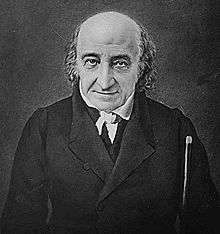 Albert Gallatin |
Democratic-Republican | March 4, 1795 – May ??, 1801 |
4th 5th 6th 7th |
Elected in 1794. Re-elected in 1796. Re-elected in 1798. Re-elected in 1800 but declined the seat to become U.S. Secretary of the Treasury. |
1795–1803 [data unknown/missing] |
| Vacant | May ??, 1801 – December 7, 1801 |
7th | |||
| William Hoge | Democratic-Republican | December 7, 1801 – March 3, 1803 |
Elected October 13, 1801 to finish Gallatin's term and seated December 7, 1801. Redistricted to the 10th district. | ||
| District not in use | March 3, 1803 – March 4, 1813 | ||||
| Aaron Lyle | Democratic-Republican | March 4, 1813 – March 3, 1817 |
13th 14th |
Redistricted from the 10th district and re-elected in 1812. Re-elected in 1814. Retired. |
1813–1823 [data unknown/missing] |
| Thomas Patterson | Democratic-Republican | March 4, 1817 – March 3, 1823 |
15th 16th 17th |
Elected in 1816. Re-elected in 1818. Re-elected in 1820. Redistricted to the 15th district. | |
| John Brown | Jackson Democratic-Republican | March 4, 1823 – March 3, 1825 |
18th | Redistricted from the 9th district and re-elected in 1822. Lost re-election. |
1823–1833 [data unknown/missing] |
| John Mitchell | Jacksonian | March 4, 1825 – March 3, 1829 |
19th 20th |
Elected in 1824. Re-elected in 1826. Retired. | |
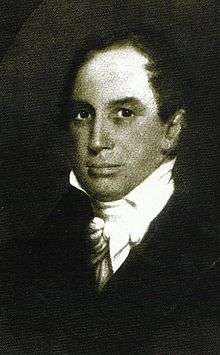 John Scott |
Jacksonian | March 4, 1829 – March 3, 1831 |
21st | Elected in 1828. Lost re-election. | |
| Robert Allison | Anti-Masonic | March 4, 1831 – March 3, 1833 |
22nd | Elected in 1830. Retired. | |
| George Chambers | Anti-Masonic | March 4, 1833 – March 3, 1837 |
23rd 24th |
Elected in 1832. Re-elected in 1834. [data unknown/missing] |
1833–1843 [data unknown/missing] |
| Daniel Sheffer | Democratic | March 4, 1837 – March 3, 1839 |
25th | Elected in 1836. Lost re-election. | |
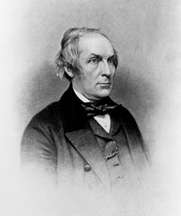 James Cooper |
Whig | March 4, 1839 – March 3, 1843 |
26th 27th |
[data unknown/missing] Re-elected in 1840. [data unknown/missing] | |
| Almon H. Read | Democratic | March 4, 1843 – June 3, 1844 |
28th | Redistricted from the 17th district and re-elected in 1842. Died. |
1843–1853 [data unknown/missing] |
| Vacant | June 3, 1844 – December 2, 1844 | ||||
| George Fuller | Democratic | December 2, 1844 – March 3, 1845 |
Elected to finish Read's term. [data unknown/missing] | ||
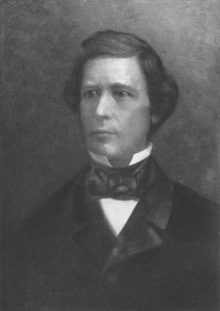 David Wilmot |
Democratic | March 4, 1845 – March 3, 1851 |
29th 30th 31st |
Elected in 1844. Re-elected in 1846. Re-elected in 1848. Retired. | |
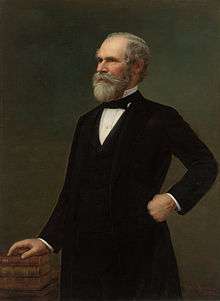 Galusha A. Grow |
Democratic | March 4, 1851 – March 3, 1853 |
32nd | Elected in 1850. Redistricted to the 14th district. | |
 Hendrick B. Wright |
Democratic | March 4, 1853 – March 3, 1855 |
33rd | Elected in 1852. Lost re-election. |
1853–1863 [data unknown/missing] |
| Henry M. Fuller | Opposition | March 4, 1855 – March 3, 1857 |
34th | Elected in 1854. Retired. | |
| John G. Montgomery | Democratic | March 4, 1857 – April 24, 1857 |
35th | Elected in 1856. Died. | |
| Vacant | April 24, 1857 – December 7, 1857 | ||||
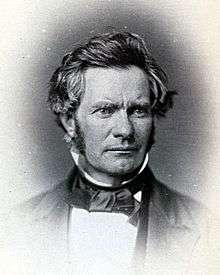 Paul Leidy |
Democratic | December 7, 1857 – March 3, 1859 |
Elected to finish Montgomery's term. [data unknown/missing] | ||
.jpg) George W. Scranton |
Republican | March 4, 1859 – March 24, 1861 |
36th 37th |
Elected in 1858. Re-elected in 1860. Died. | |
| Vacant | March 24, 1861 – July 4, 1861 |
37th | |||
 Hendrick B. Wright |
Democratic | July 4, 1861 – March 3, 1863 |
Elected to finish Scranton's term. [data unknown/missing] | ||
| Charles Denison | Democratic | March 4, 1863 – June 27, 1867 |
38th 39th 40th |
Elected in 1862. Re-elected in 1864. Re-elected in 1866. Died. |
1863–1873 [data unknown/missing] |
| Vacant | June 27, 1867 – November 21, 1867 |
40th | |||
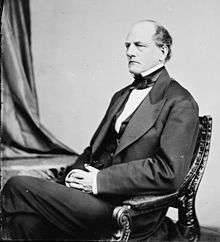 George W. Woodward |
Democratic | November 21, 1867 – March 3, 1871 |
40th 41st |
Elected to finish Denison's term. Re-elected in 1868. Retired. | |
.jpg) Lazarus D. Shoemaker |
Republican | March 4, 1871 – March 3, 1875 |
42nd 43rd |
Elected in 1870. Re-elected in 1872. Retired. | |
| 1873–1883 [data unknown/missing] | |||||
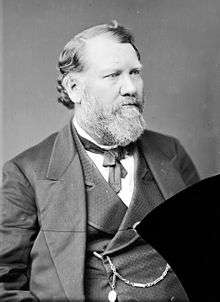 Winthrop W. Ketcham |
Republican | March 4, 1875 – July 19, 1876 |
44th | Elected in 1874. Resigned to become U.S. District Judge | |
| Vacant | July 19, 1876 – November 7, 1876 | ||||
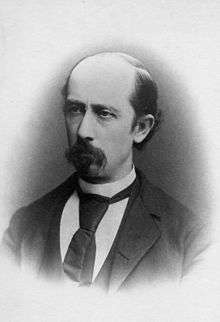 William H. Stanton |
Democratic | November 7, 1876 – March 3, 1877 |
Elected to finish Ketcham's term. Retired. | ||
 Hendrick B. Wright |
Democratic | March 4, 1877 – March 3, 1879 |
45th 46th |
Elected in 1876. Re-elected in 1878. Lost re-election. | |
| Greenback | March 4, 1879 – March 3, 1881 | ||||
.jpg) Joseph A. Scranton |
Republican | March 4, 1881 – March 3, 1883 |
47th | Elected in 1880. Lost re-election. | |
.jpg) Daniel W. Connolly |
Democratic | March 4, 1883 – March 3, 1885 |
48th | Elected in 1882. Lost re-election. |
1883–1893 [data unknown/missing] |
.jpg) Joseph A. Scranton |
Republican | March 4, 1885 – March 3, 1887 |
49th | Elected in 1884. Lost re-election. | |
%2C_Pennsylvania_Congressman.jpg) John Lynch |
Democratic | March 4, 1887 – March 3, 1889 |
50th | Elected in 1886. Lost re-election. | |
.jpg) Edwin S. Osborne |
Republican | March 4, 1889 – March 3, 1891 |
51st | Redistricted from the at-large district and re-elected in 1888. Retired. | |
.jpg) George W. Shonk |
Republican | March 4, 1891 – March 3, 1893 |
52nd | [data unknown/missing] Retired. | |
.jpg) William H. Hines |
Democratic | March 4, 1893 – March 3, 1895 |
53rd | Elected in 1892. Lost re-election. |
1893–1903 [data unknown/missing] |
.jpg) John Leisenring |
Republican | March 4, 1895 – March 3, 1897 |
54th | [data unknown/missing] Retired. | |
.jpg) Morgan B. Williams |
Republican | March 4, 1897 – March 3, 1899 |
55th | Elected in 1896. Lost re-election. | |
.jpg) Stanley W. Davenport |
Democratic | March 4, 1899 – March 3, 1901 |
56th | Elected in 1898. Lost renomination. | |
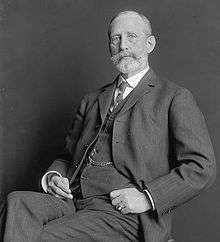 Henry W. Palmer |
Republican | March 4, 1901 – March 3, 1903 |
57th | Elected in 1900. Redistricted to the 11th district. | |
.jpg) George R. Patterson |
Republican | March 4, 1903 – March 21, 1906 |
58th 59th |
Elected in 1902. Re-elected in 1904. Died. |
1903–1913 [data unknown/missing] |
| Vacant | January 21, 1906 – November 6, 1906 |
59th | |||
 Charles N. Brumm |
Republican | November 6, 1906 – January 4, 1909 |
59th 60th |
Elected to finish Patterson's term. Retired to run for judge of the court of common pleas of Schuylkill County, Pennsylvania and then resigned once elected. | |
| Vacant | January 4, 1909 – March 3, 1909 |
60th | |||
.jpg) Alfred B. Garner |
Republican | March 4, 1909 – March 3, 1911 |
61st | Elected in 1908. Lost renomination. | |
| Robert E. Lee | Democratic | March 4, 1911 – March 3, 1915 |
62nd 63rd |
Elected in 1910. Re-elected in 1912. Lost re-election. | |
| 1913–1933 [data unknown/missing] | |||||
.jpg) Robert D. Heaton |
Republican | March 4, 1915 – March 3, 1919 |
64th 65th |
Elected in 1914. Re-elected in 1916. Retired. | |
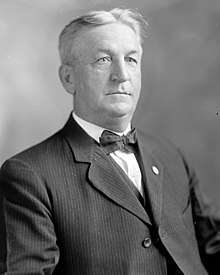 John Reber |
Republican | March 4, 1919 – March 3, 1923 |
66th 67th |
Elected in 1918. Re-elected in 1920. Retired. | |
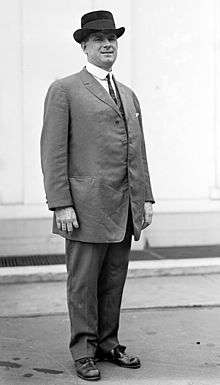 John J. Casey |
Democratic | March 4, 1923 – March 3, 1925 |
68th | Elected in 1922. Lost re-election. | |
.jpg) Edmund N. Carpenter |
Republican | March 4, 1925 – March 3, 1927 |
69th | Elected in 1924. Lost re-election. | |
 John J. Casey |
Democratic | March 4, 1927 – May 5, 1929 |
70th 71st |
Elected in 1926. Re-elected in 1928. Died. | |
| Vacant | May 5, 1929 – June 4, 1929 |
71st | |||
| C. Murray Turpin | Republican | June 4, 1929 – January 3, 1937 |
71st 72nd 73rd 74th |
Elected to finish Casey's term. Re-elected in 1930. Re-elected in 1932. Re-elected in 1934. Lost re-election. | |
| 1933–1943 [data unknown/missing] | |||||
| J. Harold Flannery | Democratic | January 3, 1937 – January 3, 1942 |
75th 76th 77th |
Elected in 1936. Re-elected in 1938. Re-elected in 1940. Resigned to become judge of the common pleas court of Luzerne County, Pennsylvania. | |
| Vacant | January 3, 1942 – May 19, 1942 |
77th | |||
| Thomas B. Miller | Republican | May 19, 1942 – January 3, 1945 |
77th 78th |
Elected to finish Flannery's term. Re-elected later in 1942. Lost re-election. | |
| 1943–1953 [data unknown/missing] | |||||
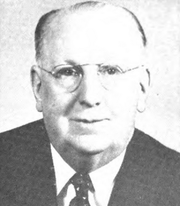 Ivor D. Fenton |
Republican | January 3, 1945 – January 3, 1963 |
79th 80th 81st 82nd 83rd 84th 85th 86th 87th |
Redistricted from the 13th district and re-elected in 1944. Re-elected in 1946. Re-elected in 1948. Re-elected in 1950. Re-elected in 1952. Re-elected in 1954. Re-elected in 1956. Re-elected in 1958. Re-elected in 1960. Lost re-election. | |
| 1953–1963 [data unknown/missing] | |||||
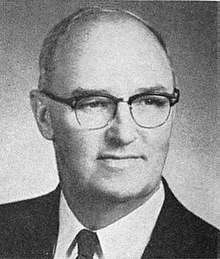 J. Irving Whalley |
Republican | January 3, 1963 – January 3, 1973 |
88th 89th 90th 91st 92nd |
Redistricted from the 18th district and re-elected in 1962. Re-elected in 1964. Re-elected in 1966. Re-elected in 1968. Re-elected in 1970. Retired. |
1963–1973 [data unknown/missing] |
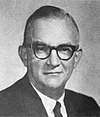 John P. Saylor |
Republican | January 3, 1973 – October 28, 1973 |
93rd | Redistricted from the 22nd district and re-elected in 1972. Died. |
1973–1983 [data unknown/missing] |
| Vacant | October 28, 1973 – February 5, 1974 | ||||
 John Murtha |
Democratic | February 5, 1974 – February 8, 2010 |
93rd 94th 95th 96th 97th 98th 99th 100th 101st 102nd 103rd 104th 105th 106th 107th 108th 109th 110th 111th |
Elected to finish Saylor's term. Re-elected later in 1974. Re-elected in 1976. Re-elected in 1978. Re-elected in 1980. Re-elected in 1982. Re-elected in 1984. Re-elected in 1986. Re-elected in 1988. Re-elected in 1990. Re-elected in 1992. Re-elected in 1994. Re-elected in 1996. Re-elected in 1998. Re-elected in 2000. Re-elected in 2002. Re-elected in 2004. Re-elected in 2006. Re-elected in 2008. Died. | |
| 1983–1993 [data unknown/missing] | |||||
| 1993–2003 [data unknown/missing] | |||||
2003–2013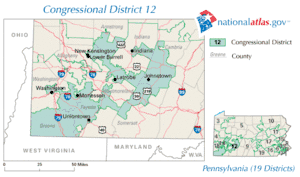 | |||||
| Vacant | February 8, 2010 – May 18, 2010 |
111th | |||
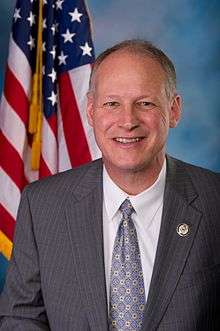 Mark Critz |
Democratic | May 18, 2010 – January 3, 2013 |
111th 112th |
Elected to finish Murtha's term. Re-elected later in 2010. Lost re-election. | |
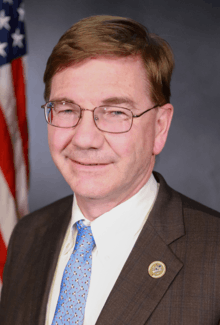 Keith Rothfus |
Republican | January 3, 2013 – January 3, 2019 |
113th 114th 115th |
Elected in 2012. Re-elected in 2014. Re-elected in 2016. Redistricted to the 17th district and lost re-election. |
2013–2019.tif.png) |
.jpg) Tom Marino |
Republican | January 3, 2019 – January 23, 2019 |
116th | Redistricted from the 10th district and re-elected in 2018. Resigned.[10] |
2019–present |
| Vacant | January 23, 2019 – May 21, 2019 | ||||
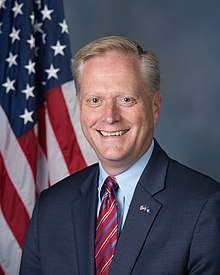 Fred Keller |
Republican | May 21, 2019 – present |
Elected to finish Marino's term. | ||
References
- "New Pennsylvania Map Is a Major Boost for Democrats". The Cook Political Report. February 20, 2018. Retrieved February 21, 2018.
- "Congressman Tom Marino resigns, leaving vacancy in Pa.'s 12th district". Centre Daily Times. January 17, 2019. Retrieved January 17, 2019.
- "Keller to take the oath of office on June 3". Daily Item. May 24, 2019. Retrieved May 26, 2019.
- Cohn, Nate; Bloch, Matthew; Quealy, Kevin (February 19, 2018). "The New Pennsylvania House Districts Are In. We Review the Mapmakers' Choices". The Upshot. The New York Times. Retrieved February 20, 2018.
- Becker, Bernie (March 8, 2010). "Dems Choose Nominee for Murtha Seat". The New York Times. Retrieved March 9, 2010.
- Faher, Mike (March 12, 2010). "GOP chooses Burns for special election in 12th". The Tribune-Democratic. Retrieved March 12, 2010.
- "2012 General Election: Representative in Congress, District 12". Pennsylvania Department of State. Archived from the original on 16 November 2012. Retrieved 15 November 2012.
- Levy, Marc (March 2, 2019). "GOP state lawmaker becomes favorite in House race to succeed Marino". Center Daily Times. Associated Press. Archived from the original on March 7, 2019. Retrieved March 7, 2019.
- "Pennsylvania Democratic Party Announces Candidate For Special Election In The 12th Congressional District - Pennsylvania Democratic PartyPennsylvania Democratic Party". Padems.com. February 12, 2019. Retrieved March 7, 2019.
- "Ex-Congressman Marino Now Cites Health for Resigning". US News & World Report. Associated Press. February 12, 2019. Retrieved February 14, 2019.
- Martis, Kenneth C. (1989). The Historical Atlas of Political Parties in the United States Congress. New York: Macmillan Publishing Company.
- Martis, Kenneth C. (1982). The Historical Atlas of United States Congressional Districts. New York: Macmillan Publishing Company.
- Congressional Biographical Directory of the United States 1774–present
- Congressman Tom Marino resigns, leaving vacancy in Pa.’s 12th district